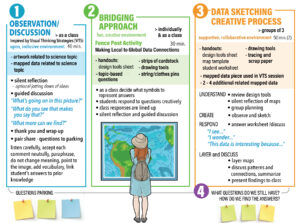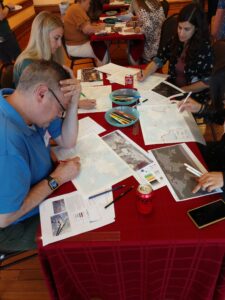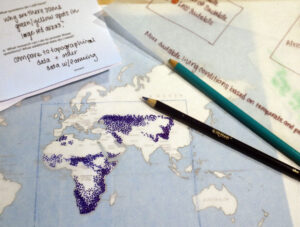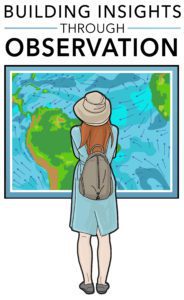Building Insights through Observation
Building Insights through Observation is a project funded by the National Science Foundation, designed to advance our understanding of how science teachers can learn to incorporate arts-based teaching methods and visualizations of authentic science data into their pedagogical practices in order to improve students’ data literacy and critical thinking skills.
Overview Sign Up to Learn More
Innovations in data collection, infrastructure, and visualization play an important role in modern society. Large, complex datasets are accessible to and shared widely with the public. However, students need to learn how to interpret and reason about visualizations of scientific data. This project uses geospatial visualizations along with arts-based pedagogies for observing, analyzing, and critiquing visual features of data visualizations to help students develop critical thinking skills and practices required to effectively make meaning from authentic scientific data. We are working with 10 middle school science teachers from across the country to develop tools for STEM educators to use these data visualizations effectively. This project focuses on visual thinking skills that have been found to apply in both science and art: describing, wondering, recognizing uncertainty, and interpreting with evidence.
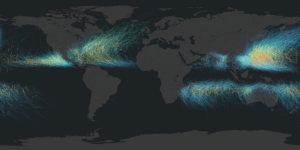
Applying a design-based research framework that partners with teachers, this foundational research will help us understand the ways in which arts-based instructional methods and geospatial data visualization can be successfully applied by science teachers. The research will examine: (1) the ways in which arts-based instructional methods can be successfully applied by STEM teachers; (2) critical elements in the process of learning and applying these techniques to influence teachers’ content, pedagogical, and technological knowledge; and (3) for which transferable data literacy skills these approaches show most promise with children. The research process will include data about teachers’ development and students’ learning about data literacy.
Outcomes
- An adaptive digital toolbox is freely available to teachers to apply the framework to their curriculum. Example lessons are provided and resources for implementing the model for a range of earth and environmental topics are included.
- A peer-reviewed journal article describing the project and our research was published in the March/April issue of Science Scope. You can read the open access article Building Insights Through Observation: Integrating Art and Science to Support Sensemaking, published in Science Scope, Volume 48 Issue 2.
- Semmens, K., Sickler, J., Maxfield, K., Goldner, M., Curry, D., Peddicord, H., … Carr, R. H. (2025). Building Insights Through Observation: Integrating Art and Science to Support Sensemaking. Science Scope, 48(2), 30–38. https://doi.org/10.1080/08872376.2025.2463906
Building Insights Through Observation Model
The components of the Building Insights through Observation include Observation and Discussion (inspired by Visual Thinking Strategies – see vtshome.org for more details and training) and Design Thinking (Data sketches). The process encourages slowing down and student-led inquiry.
Download a Flyer describing the project: BIO Insights Flyer_
Hear from our current cohort of middle school science teachers about their participation in the Building Insights through Observation program.
Teachers working on their data sketches during our Teacher Professional Development Workshop at the Nurture Nature Center in June 2023.
Project Team
- Nurture Nature Center – PI Kathryn Semmens, co-PI Keri Maxfield, Rachel Hogan Carr
- J. Sickler Consulting – co-PI Jessica Sickler, Michelle Lentzner
- CIRES – co-PI Hilary Peddicord
- Education Development Center Oceans of Data Institute – co-PI Amy Busey, Randy Kochevar, Erin Bardar
Teacher Partners
- Dave Curry, Newtown Middle School, Newtown PA
- Mark Goldner, Heath School, Brookline, MA
- Alyssa Solis-Cortez, Irving STEAM Magnet School, Los Angeles, CA
- Caitlin Brenton, Flowing Wells Junior High School, Tucson, AZ
- Doug Eccher, Peak Academy, Montrose, CO
- Cynthia Hopkins, Kaffie Middle School, Corpus Christi, TX
- Mary Ann Cowley, Otto Middle School, Plano, TX
- Ben Horner, Ethical Culture Fieldston School, Bronx, NY
- Sarah Slack, I.S. 223 The Montauk School, Brooklyn, NY
- Nessa Goldman, Olympic Peninsula Academy, Sequim, WA
This material is based upon work supported by the National Science Foundation under Grant No. 2101310. Any opinions, findings, and conclusions or recommendations expressed in this material are those of the author(s) and do not necessarily reflect the views of the National Science Foundation.



